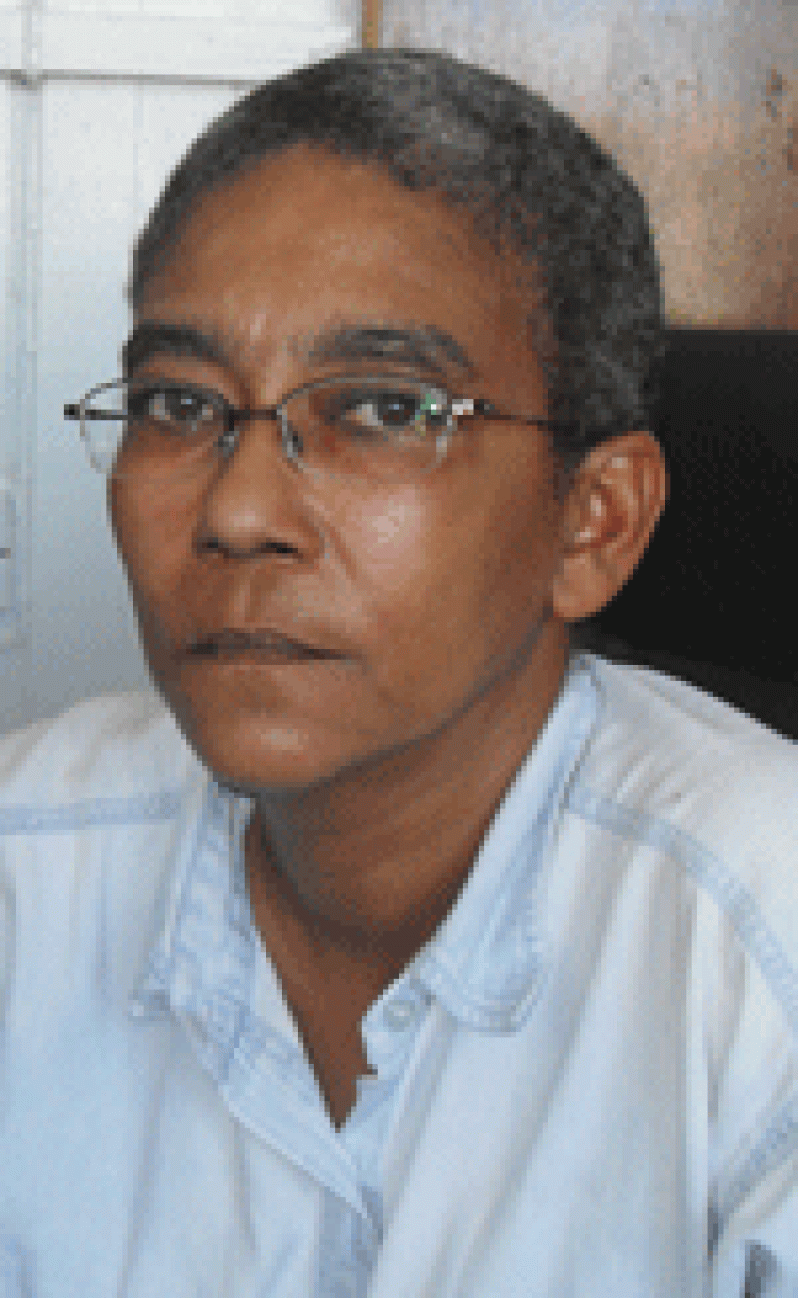IN AN almost ten-minute address to dozens, including ministers of the Government and members of the diplomatic corps, Red Thread executive member Karen DeSouza said it is her personal view that when it comes to penalties for acts of violence against women and children, those responsible should have their penalties measured according to their stature in society.  In essence, “The more senior you are, and are guilty, your penalty should be much harsher,” for failing to set an example and exercising leadership.
In essence, “The more senior you are, and are guilty, your penalty should be much harsher,” for failing to set an example and exercising leadership.
DeSouza said a strong and stern approach needs to be taken when it comes to the issue of domestic violence.
She made the comments at the launching of the National Conversation on Domestic Violence, held at the International Conference Centre at Liliendaal, East Coast Demerara on June 28.
DeSouza said the sixteen-year-old Domestic Violence Act has seen many conversations, workshops and other sensitization programmes, but the problem remains, and continues to affect society at an alarming level.
She added that if Guyana wants to be seen as a country taking a serious approach against domestic violence, then some strong messages ought to be sent to offenders.
The social activist said it is unfortunate that the recently started National Conversation will not be reaching all the communities of the country, despite the needs of all communities to be adequately educated in this regard, especially some areas in the hinterland which she named.
According to her, some of those areas lack basic critical services in some instances, making it necessary for them to be exposed to the ongoing conversations. DeSouza called on the powers that be to address those and other issues of the hinterland locations, since the residents there are also faced with the issue of domestic violence like every other community, and need the services that are readily accessible to some persons.
She also spoke to the issue of interference in the course of justice, telling the gathering that there must be a strong and decisive approach against this practice which seems to be slowly becoming a normal and accepted behaviour.
She said interference is mostly practised by persons closely associated with those accused of and/or charged with abuse against women and children, and in some cases boys.
She declared that a blind eye can no longer be turned to the issue of domestic abuse, because it ultimately turns the issue into an expensive one for ordinary people, who sometimes are unable to get their reports past a certain stage of the investigation.
Violence, both domestic and sexual, continues to be ever present in all spheres of our society, and affects persons of all professions and social levels, she said.
The social activist mentioned that certain acts of violence are handled differently from those of ordinary people. High class acts of violence, she explained, are in most cases dealt with in a manner that prevents reports from reaching the police, the public or the courts.
DeSouza said that as individuals and persons, we can each put a stop to this issue. She said that regardless of who the accused is, we each need to call them out. We should not protect them, and should not be intimidated by those who are seated in high office, she added.
According to her, one of the biggest bugbears for persons who take complaints of domestic and other acts of violence to the police is getting the police to investigate “their own”. Admittedly, there are some officers who work according to the law books, but there are those who allow themselves to be influenced by extraneous considerations, especially when the allegation is made against one of their superiors.
She described such issues as the genesis of poor people’s problems, and opined that it must stop.
DeSouza acknowledged the Government’s strides in addressing the issue of domestic violence legislatively and institutionally. She, however, lashed out at the magistrates, accusing them of throwing out some cases of domestic violence, and, in some instances, asking victims to pay sums for their failure to give evidence.
It was against that backdrop she mentioned that victims of abuse must know there are higher authorities to which they can go when they experience injustice.
DeSouza explained that there needs to be a revisiting of the process in dealing with some cases of domestic violence and abuse. She pointed to the many meetings and engagements that sometimes have to be done among committees and officials before some decisions are made relative to the welfare of victims of domestic violence.
The social activist strongly recommended that the bull be taken by the horn when it comes to mixed messages placed in the public domain relative to the stance by the various agencies in relation to actions against domestic and other forms of violence.
She said that domestic violence should be called what it is, and those guilty of this type of abuse should be dealt with condignly.
Tackling domestic violence… PUNISH OFFENDERS ACCORDING TO THEIR STATURE IN SOCIETY –Karen DeSouza
SHARE THIS ARTICLE :
Facebook
Twitter
WhatsApp



.jpg)








